They don’t call it a rivalry.
It’s almost like Vince Kehres and Lance Leipold held a clandestine meeting somewhere between northeast Ohio and southern Wisconsin to decide what the appropriate term for their annual appointment in the Stagg Bowl should be.
At 7 p.m. on Friday, the schools’ unprecedented run continues when the Mount Union Purple Raiders and Wisconsin-Whitewater Warhawks meet with the Division III football championship on the line.
These two methodical dynasties have met nine of the last 10 years in Salem, Va., for another addition to the trophy case. Yet Kehres, in his second year as head coach at Mount Union, still doesn’t want to call this a "rivalry."
“A rivalry is something you know is on your schedule year in and year out like the Browns vs. the Steelers or Ohio State vs. Michigan,” Kehres told Sporting News. “It’s not a rivalry to me because we can’t project who we play at the end of the season. I like the word ‘respect.’ We have a lot of respect for each other’s programs.”
Now listen to Wisconsin-Whitewater coach Lance Leipold.
“I’ve always said rivalries are the ones like Oklahoma-Nebraska, Florida-Florida State, Michigan-Ohio State,” he said. “Those are the games on the schedule. You’re going to play your rival. In this thing, you have to earn the opportunity. Maybe I’m the one that’s a little bit off.”
No, he’s not. It’s a run perhaps never seen at any level of sport. The Los Angeles Lakers and Boston Celtics met in the NBA Finals six times in the 1960s. The New York Yankees and Brooklyn Dodgers played in five World Series from 1947-56.
Mount Union vs. Wisconsin-Whitewater isn’t considered in that vein. Maybe it should be. Kehres and Leipold have simply carried the torch from their predecessors.
Former Mount Union coach Larry Kehres won seven national championships from 1993-2004 before facing Wisconsin-Whitewater coach Bob Berezowitz for the first time in 2005. The Purple Raiders won three of four head-to-head title matchups over the next four years, but the Warhawks have won the last four under Leipold. He’s been taking that age-old question ever since. How can two programs be this dominant for so long?
“Four years ago I was asked the question, and I said I wish I would find a way to visit and go talk with them,” Leipold said. “Because of the possibility of playing each other, we don’t like to open doors to each other. I would like to find out the ways they do the things they do.
“You see the differences and similarities,” he said. “But you know (Mount Union) is going to take everybody's best shot every week. To sit there and still answer that bell every time; that’s incredible.”
Leipold laughed when asked if he would do that next week when he takes over as the head coach at Buffalo, a position he accepted before the latest playoff run. What Leipold would find isn’t that much different than what’s going on at Whitewater.
Kehres builds from within. Kehres took over for his father after serving as a defensive coordinator. Mount Union’s coaching staff is built around former players. Almost everybody can build on a never-ending pay-it-forward national championship experience.
It’s a day-to-day process. Revenge is never a motivating factor. The focus is always inward first. Kehres and Leipold both said they didn’t watch film on the other team until Monday.
That might be the key to building unheard of success in the one sport where it might not seem possible, even at a level with a 32-team playoff format. Expansion started in 2005, which happens to be the start of this 10-year run.
“One thing, and I think Coach Leipold can relate to this, is it really is hard to get to this point and still be playing,” Kehres said. “There are a lot of great Division III football teams. It’s a credit to the players, the coaches and schools to have the will to prepare and grind out good days through November and late September.”
The latest chapter promises more of the same. Mount Union averages 60.3 points per game and allows 9.3 points per game. Wisconsin-Whitewater averages 39.9 points per game and is looking to add to its nation-best 31-game win streak, not to mention its fifth 15-0 season in six years.
“I think you’re going to see really clean, crisp football,” Kehres said. “Both teams execute at a high level and test the execution of the other team. There won’t be a lot of penalties or a lot of sloppiness.”
Again, Leopold offers an almost-identical answer as he prepares to coach his final game at the Division III level.
“It will be well-coached on both sides of the ball,” he said. “It’s two teams that play the game the way it is supposed to be played.”
Who could argue with that?

